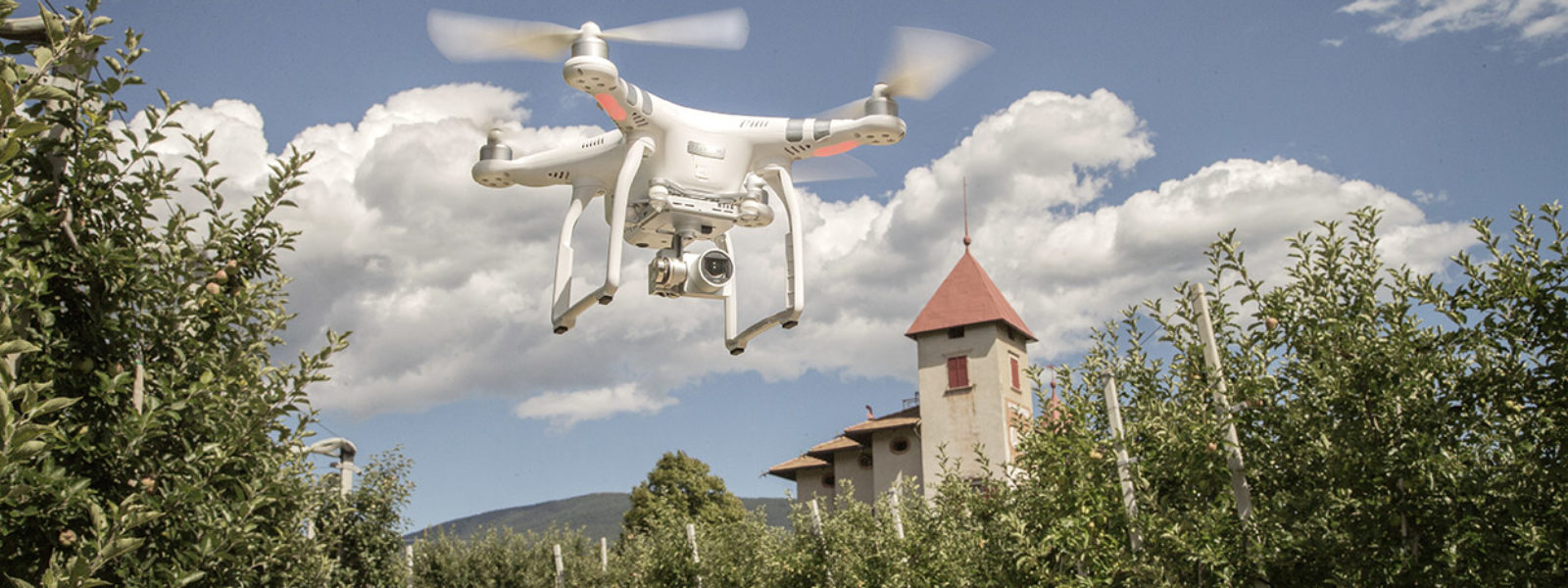Digital Agriculture
Digital technologies for agriculture represent an application domain of primary interest for Italy and for research at FBK. Italy is facing the challenge of a more efficient agriculture, able to improve the quality and value of products by improving environmental sustainability and enhancing local identities to the maximum extent.
The application of Artificial Intelligence to environmental and climatic data, collected automatically in the field by machines, together with the company’s process data allow the development of solutions capable of promoting efficiency and productivity, improving the yield and sustainability of agricultural practices.
Strengths of the FBK model
FBK’s ten-year experience and its network of local, national and international partners make for an ideal innovation ecosystem to experiment with possible applications of AI in agriculture: from scientific research to technology transfer on sensors, remote sensing, IoT platforms and machine learning applications. Long-term collaborations with leading companies have allowed us to develop new Data Science and Deep Learning tools, IoT platforms and high-quality low- cost connected devices able to monitor the life cycle of crops and optimize management.
Featured projects
Italy, and FBK in particular, is coordinating the European AgrifoodTEF project that will develop testing and experimentation infrastructures for new Artificial Intelligence- and Robotics-based products and services, to provide support for the European agrifood industry.
The winner of a call for proposals launched in 2022 by the European Commission (part of the Digital Europe program), the AgrifoodTEF project has a total budget of 60 million euros and a time horizon of five years. The consortium is composed of some of Europe’s leading players in the field of digital innovation applied to agrifood production. Organized in three national nodes (Italy, Germany, France) and four satellite nodes (Poland, Belgium, Sweden and Austria), it offers its services to companies and developers from all over Europe who want to validate their innovative solutions under real-life conditions of use, speeding their transition to the market.
In addition to FBK, its coordinator, the Italian node includes national excellence such as the University of Naples Federico II – coordinator of the National Agritech Center – the Polytechnic University of Milan and the University of Milan, the Edmund Mach Foundation, a center of excellence in agronomic research and innovation, and Engineering Informatica, a reference company for the digital transformation of the agricultural sector.
The European nodes of this important network of facilities include Italy, coordinated by FBK, France, coordinated by LNE, Germany managed by University of Osnabrück and DFKI, the Netherlands with the involvement of Wageningen, Belgium with the contribution of ILVO, Sweden coordinated by RISE, Poland headed by Lukasiewicz Institute L-PIT, Austria coordinated by Josephinum Research and Spain coordinated by the University of Lleida.
AgrifoodTEF is funded 50 percent by the European Commission and the remaining 50 percent by the governments of the states participating in the consortium-the Ministry of Enterprise and Made in Italy, for the Italian side.
Interested companies can take advantage of AgrifoodTEF services by contacting project coordinator Raffaele Giaffreda directly.

Raffaele Giaffreda
AgrifoodTEF European project coordinator, Chief IoT Scientist FBK Digital Industry Center
[email protected]
[email protected]
The AgriDataSpace project (a Coordination and Support Action of the Digital Europe call for proposals) aims to coordinate activities and actions preparatory and preliminary to the creation of a European Data Space for agriculture.
The project, coordinated by the French Agdatahub, aims to lay the groundwork for the creation of systems that facilitate the exchange, processing and analysis of data in a way that is secure, reliable, transparent and respectful of the sovereignty of these data. The expected results are guidelines for the implementation of those enabling systems that, through shrewd and participatory management of collected data, will create new opportunities for monitoring and optimizing resource use in agriculture, stimulating innovation actions that support the digitization of the sector.
The role of Fondazione Bruno Kessler in the project is to coordinate activities dedicated to the development of reference architectures that include the use of the latest technologies created to promote a new data economy in agriculture that is rooted in the existence of shared data spaces and the possibilities of exploitation of data collected in various production contexts of the agriculture industry. An important and characterizing aspect in this context is the respect for the principle of data sovereignty according to the principles also promoted by GAIA-X, of which FBK is one of the founding members at the national level.

Raffaele Giaffreda
WP Leader for activities on Technology Panorama Data Spaces in agriculture
 IRRITRE is a territorial information system for Trentino Province designed to promote and facilitate efficient irrigation management through precision irrigation practices.
IRRITRE is a territorial information system for Trentino Province designed to promote and facilitate efficient irrigation management through precision irrigation practices.
The project is jointly implemented by the PAT (Agriculture Department), FBK, FEM, Trentino Digitale.
The goal of the IRRITRE platform is to provide easily accessible and consistent tools for irrigation consortia and the various actors involved in the irrigation management process, as well as a spatial digital infrastructure that allows the grounding of monitoring, control and automatic implementation systems for irrigation decisions to achieve:
- a reduction in irrigation consumption through variable-rate irrigation techniques;
- enable analysis, planning and optimization of water distribution, including for damage prevention interventions (anti-freeze) and savings incentives.
IRRITRE is based on the combination of a set of Agriculture 4.0 technologies ranging from IoT sensors in the field, IoT communication technologies and implementation systems for automation of irrigation choices, collection of weather data and forecasts, satellite information, which are combined through the use of artificial intelligence in order to provide monitoring and control capabilities, predictive models and planning tools for the use of the irrigation resource and its impact on crops.
Where IRRITRE is currently being applied and validated:
IRRITRE intends to cover the irrigation needs of the entire Trentino territory and will also be fielded and validated in 3 pilot areas of Trentino (Valli del Noce, Valle dell’Adige, Basso Sarca), areas with high impact in irrigation consumption and significant from an economic point of view (apple and wine production), areas characterized by different orographic conditions and aggregating different production realities and organization of irrigation management, so as to maximize the evaluation of the adoption of new management policies and technologies.

The SAPIENCE project enables virtuous behavior in the agricultural sector by combining techniques for measuring and tracking the use of irrigation resources with incentive and reward tools. In particular, SAPIENCE promotes the efficient use of irrigation water, aiming to achieve a significant reduction (30% or more) compared to drip irrigation systems. This is possible thanks to monitoring based on IoT and blockchain technologies supported by a specific reward system that will encourage the virtuous behavior of the players.
AI solutions for wine production
In cooperation with CAVIT, FBK has developed a set of algorithms and systems to support winemakers during the fruit development phase up to the harvest. The system consists of different types of solutions to meet three different needs:- Portable spectrometer with an AI system for in-field monitoring of oenological parameters (Brix and total acidity) during the pre-harvest phase;
- Deep Learning Model for early production estimation, analyzing images collected in the field via commercial smartphones;
- Deep Learning model for image segmentation and classification to recognize and quantify pests and optimize pesticide interventions.
FBK, in cooperation with companies Eoptis and Sal Engineering, has developed a multispectral camera that allows for the acquisition of images in numerous spectrum bands from drones. These images, suitably processed and analyzed with different Machine Learning techniques, allow to obtain vegetation development and health indices.

If you are already a subscriber of this newsletter, you can request to update your preferences or to cancel your subscription.
We've sent you an email message, which contains all details to confirm your address to complete the signup to our newsletter.
Something went wrong during this request, please try again and make sure all information is entered correctly.


